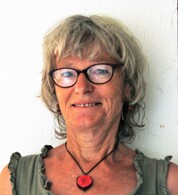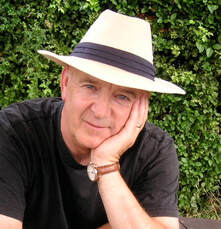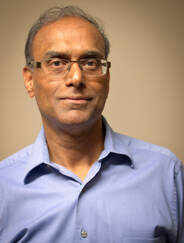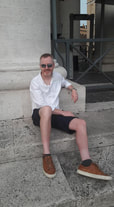|
Short Fiction ~ Elaine Barnard First Prize, Strands International Flash Fiction Competition - 4 He got on this trolley last stop. Now he don’t stop walkin-walkin-walkin. Like he got somethin bad on his mind. Could be he a terrorist like they show on the TV or one of them crazies that shoot up shoppin malls. I sit tight. But he keeps movin, his baseball cap pulled down over his eyes sos I can hardly make out his face. He has this huge pack on his back. Who knows what’s in it. I don’t think I want to find out. I’m not sayin a word to him. No way. If I be real quiet I figure he won’t notice me even though I’m wearin these gold slipons that I got from my last lady, Mrs. Johnson. She was gonna throw them out. I was so proud of the way they glittered. But now I wish I had on my old white sneakers. They no longer white but just sorta gray even though I hosed them down and set them in the sun to bleach dry. He’s at the other end of the trolley now but comin this way. When he gets right in front of me he looks at the trolley pole careful like. Then he circles it as if he was measurin his steps. Maybe measurin the distance from one end of this trolley to the next. See if his bomb could explode in the center and do a good enough job on all of us. A boy and girl sit near the exit. Her head is on his shoulder. He kisses her light like. She smiles. Pretty girl, fluffy black hair, skinny boy, so serious. I hope they get off before anything bad happens. I cross my legs, uncross them. Try to shrivel into my seat so maybe he won’t see me. But my slipons are a dead giveaway. He’s comin this way again. His arms look strong. If he decided to take a whack at me I’m sure I’d be done for. His black T-shirt stretches tight across his hairy chest. His jeans hold their shape. He maybe thirty five or so. A lot younger than me anyways. I’m hopin he notices the teddy bear in my sack. God has mercy on little children. Or so they say. I’m hopin he’ll have mercy on my teddy bear. It’s not a great lookin teddy. Kind of a tired brown. I rescued it from the dumpster. Givin it to my granddaughter if I ever see her again. Two more get on. A fat white lady with a super-sized drink and a greasy bag of chips. The grease turns my stomach bein I haven’t ate since yesterday. Trolley rules say no drinks, no eats, but who’s to know? The honor system ain’t honored here. The fat lady’s daughter is fat too. She’s chompin a fat chocolate bar. Also a bag of peanuts. Chocolate smears her lipstick. Nuts between her teeth. She don’t talk to her mother. She just talkin on her cell like she don’t know how to stop. I could use some of their fat. I’m so thin one big wind could blow me out the doors. It’s muggy hot today so a big wind not likely but you never know. He don’t look at me when he comes this way again. He don’t look at anyone. And no one looks at him. We all afraid to look at him. I’m thinkin maybe he’s not a terrorist. Maybe he’s just wrong in the head like my husband after he back from Vietnam. He walked the house day and night. Finally walked off for good. I’m still lookin for him. Bring him home. Everyone needs a home even if they wrong in the head. Doors open. Old man in a wheelchair tries to push in. Chair so big he can’t make it. He shoves and shoves but his wheels catch in the door. It tries to close on him. I sit tight. Everyone sits tight watchin the old man struggle. None of us has the strength to budge the chair. The terrorist stares at the old man. I wonder what he’s thinkin. What he’s plannin to do. I hold my breath. The fat ladies stop eatin. The cell phone is silent. All eyes on the terrorist. Suddenly he lunges toward the empty seats opposite the door. He shoves them up against the wall. Makes room for the old man. Then he rushes to the chair and drags it in. I breathe. The fat ladies eat. The cell phone talks. The old man smiles. The terrorist continues pacin. Maybe if he pace long enough he’ll make his head right. He’ll sit down and do nothin like the rest of us.  Elaine Barnard's stories have been published in numerous literary journals. The collection of stories from her travels in Asia, The Emperor of Nuts: Intersections Across Cultures was published in 2018 by New Meridian Arts. Her work was featured in the New Short Fiction Series at the Annenberg Center in Santa Monica, CA. She received her MFA from the University of California, Irvine and her BA from the University of Washington, Seattle.
0 Comments
Short Fiction - Gillian Brown Second prize, Strands international Flash Fiction Competition -4 ‘You’ll never succeed,’ the chief monk said, eyeing me up on arrival, ‘as long as you hold onto your possessions.’ ‘But I have almost nothing. The bare minimum.’ ‘Minimum is too much.’ I roll off my sleeping mat as I remember that first conversation. I’d learned basic Mandarin in preparation for this, more than enough to understand his meaning. It is winter now in western China and the cold seeping up from the stone floor chills my bones every night. The reward at daybreak comes with a rush of adrenalin. Outside, forests garlanded with snow cover the mountainsides. The mist evaporates, revealing a sapphire sky. Zero pollution. Almost-heaven, but not quite. My aim is to reach nirvana – the state of perfect happiness and enlightenment. Few attain this in a lifetime, and I’ve only been here a few months. The tiniest obstacles – gigantic in the mind of Buddhists – keep blocking my path. ‘You don’t need that.’ Their eyebrows jam together. Their heads shake. My suitcase is modest; very small, bought cheaply in a charity shop for its potential longevity. Its rigid brown leather exterior has already survived many knocks whilst travelling here overland. ‘Whatever is in it?’ they ask. I shrug. ‘Basics.’ I open it up now thinking no-one is watching and take out the photo of Gemma. I can smell the jasmine conditioner in her hair, feel the softness of her skin and hear her infectious laughter. ‘I’ve met someone else,’ she said. A shadow falls beside me. My heart jumps. ‘Desire clouds the brain. Love is irrelevant.’ The novice monk walks on, the swish of his orange robe a hushed whisper in the silence. Then, over his shoulder, ‘Every item in that suitcase carries a history, recalls painful moments or awakens old desires.’ His words send prickles of guilt down my spine. The Buddhist way is more demanding than I ever imagined. My shoulders sag. I am never going to attain nirvana with my current mind-set. Spring arrives. The snow melts. Mountain streams gurgle and trickle. With a heavy heart, I gather my possessions and head for home. Down, but not out. On the way, strangers give me shelter, feed my groaning stomach and soothe my blisters. One night, I collapse by the roadside, overcome with exhaustion. A boy jumps out from nowhere and snatches my suitcase. Seized by a wild panic, I scream. He trips and drops it, running away. What’s it to him? Nothing. What’s it to me? Good question. I stagger towards it and sleep clutching it to my stomach, as if it were a pot of gold. Back home, my family and friends avoid me. I’m bone-thin. My trainers are scuffed and stained, my jeans frayed and my down jacket torn. I don’t fit into polite society. I’m hungry. Nobody feeds me. Job interviews end before they begin. I flop down in the disused doorway I call home. My mind flashes back. When I first reached the monastery I used to dream of an inner-sprung mattress. Then I learned advanced meditation. Stretching out on the concrete ground, I free my mind from my body. For a brief glorious moment, I rise above my physical self and look down. A car roars past. The spell is broken. I zip up my down jacket and rest my head on the suitcase, more for safety than comfort. Closing my eyes, familiar words in Mandarin whisper in my ear. ‘Belongings cause stress.’ I shove this thought aside with an irritated shake of the head, instead making a mental list of what I have left. 1. My photos of Gemma. 2. A cell-phone with no sim-card. 3. My Post Office savings account book – balance £1.00. 4. Paul Brunton’s classic: ‘A Hermit in the Himalayas’. 5. A Mandarin dictionary. 6. Shaving gear. 7. My harmonica. 8. My passport. Next day, the sun shines. It makes people generous. They appreciate my music. Soon I have enough coins in my cap to buy a hamburger and some extra-strong lager. Satiated, my eyelids start to droop. Lying on my side, the hard leather suitcase under my head, I twist back and forth before angrily tossing the case behind me. I make a softer pillow with my down jacket, settle back and close my eyes. My body lies rigid. I can’t sleep. The monk’s words reach me as clearly as if he were standing beside me. ‘Your mind is clouded with anxiety. And thoughts of thieves.’ My muscles tense further. ‘Possessions are an obstacle.’ This truth is harder to dismiss, but with a shiver of defiance I reach into my case. I grab both my harmonica and my passport and stash them in my back pocket. At dawn, a train thunders into the nearby station. I sit up with a jolt. My head is groggy from the lager and I decide to have a shave in the public toilets before the commuters arrive. The pink light of sunrise peeking over the rooftops raises my spirits, sending a wave of wellbeing through my veins. I smile as I reach over for my shaving gear. The suitcase is gone. I scratch around wildly in the empty space. My hands fly to my back pocket. Both my harmonica and passport are still there. I slump back, jingling in my hand the loose change I have left. I breathe in through my nose and out through my mouth for several minutes. Then I revise my list. 1. Gemma is the past. Nostalgia is a wasted emotion. 2. I’ve no-one to call on the phone. 3. I can earn a quid in less than an hour. 4. I’ve read Brunton’s book six times. I know it almost by heart. 5. There’s little need for Mandarin here. 6. What’s wrong with a beard? The last two items – my harmonica and my passport – are essential for my survival. If holding onto them means I can never attain nirvana, so be it. I can live with that.  Gillian Brown started out as a travel writer but now concentrates on fiction. Her inspiration often comes from her travels or real life experiences. Motivation comes from short story competitions, for which she has a mild – but enjoyable – addiction. She has had stories published in magazines, in anthologies and online and won and been shortlisted in various competitions. Short Fiction ~ Oscar Windsor-Smith Third Prize, Strands International Flash Fiction Competition -4 He’s here to find his father, this man in middle age with the new woman who might be his future. Sitting, close but not yet touching, on a weather-beaten bench on the ancient quay, they’re gazing out over the Conwy River at buildings gilded by the setting sun. A bright reflection flares from some moving object on the far bank. It creates a false light whose beam swiftly traverses the two bridges across the river to their junctions with the nearer bank. The man's gaze follows the reflected light, arriving at the medieval castle that dominates Conwy with illusions of protection and permanence. Illusions of permanence, the notion has barely formed before it flies off on a freshening breeze. Wheeling gulls disturb his reverie with their mocking shrieks. One lands in search of tourist titbits, strutting the granite quay where its forebears dined on fresh-caught fish. The man stands. Eyeing the last departing visitors he inhales a whiff of sun lotion and ice cream. He grimaces. The woman extends her hand to touch his but he’s already out of reach, eyes unfocussed: his awareness in the past. On the bustling quay, rank with the stink of diesel and rancid fish, night and weather are closing in. Lines of small trawlers strain at their mooring ropes, eager to be back at sea. Yet there in sepia memory, emerging from a confusion of seamen loading tackle and supplies comes his father, striding forward. He’s wearing tweeds: those ridiculously inappropriate golfing trousers. He stops a child's arm length away, so tall. Gazing at one of the trawlers, the father pulls from his pocket a briar pipe and a pouch of tobacco. He fills the pipe and strikes a match with practised posture to protect the flame from biting wind. In that brief illumination, the son scans the father's face for clues. The mature son interrogates the imagined smile: does it suggest determination, resignation, or mental torment? His father was a gunner in the World War – only two years before – did something happen his mind couldn't handle? What were you thinking, Dad? You, a landlubber who'd never been sea-fishing in his life. Giving the match a needlessly long shake, the father casts it into the boiling waters and shoulders his kit bag. I love you dad. A strong hand reaches out, ruffles the son's hair, and then the father is gone, striding down the gangplank with the crew. So did Mum. She married twice more but I believe she loved you till the day she died. The drone of diesel power rises to a chugging crescendo as expert hands cast off the mooring ropes and the tiny trawler surges into the river. The father turns, waves, and the child half-hears his parting shout – ‘It’s the only way to live, boy. We have to catch the tide.' – the last sight and sound of him the son will ever have. The phantom words still echo on the silent quay when a warm hand touches his. 'You okay?' The boy-man nods, his mind still in the past but now on a course of his own. He murmurs, ‘Would you like to spend the rest of your life with me?’  Oscar Windsor-Smith is an English writer from Merseyside, now resident in south Hertfordshire, UK, with fiction and non-fiction prose and a smattering of poetry published in diverse places, in print and online. His short fiction has appeared in a number of anthologies, most recently in the Departures anthology from Arachne Press. He graduated from the 4-year BA creative writing course at Birkbeck, University of London, in 2018, having specialised in screenwriting, but is returning to his first love, short and flash fiction. Short Fiction ~ Murali Kamma Honourable Mention, Strands International Flash Fiction Competition -4 When Ben called to give the news, Gary was so unsettled that he quickly shut his office door and, clearing his throat a little agitatedly, asked him to repeat it. “You heard me right,” Ben said, his voice strangely drained of emotion, as if he hadn’t been surprised by the bombshell. “Arthur wrote The Unknown.” Disbelief was followed by an unpleasant wave of envy that felt more like nausea, forcing Gary to slump on his chair as he absorbed the shock of this revelation. To think that Arthur, a prickly literary dabbler, had written the majestic novel everybody was talking about seemed too much, too disturbing. Notorious for his caustic comments about successful authors, Arthur made infrequent appearances at their local bookstore, which doubled as a salon for coffee-fueled gossip and competitive jousting. When a famous author came to give a reading, the wannabes turned up in full force and you couldn’t find a seat. Inevitably, the Q&A that followed would feature a self-promoter or two, not to mention a smart aleck like Arthur. It wasn’t a big town, so how had Arthur managed to keep his immense talent a secret? The Unknown was absorbing, dense, exhilarating—and even before Gary, an aspiring writer, heard that the 500-page novel had won the nation’s richest, most prestigious literary award, he hadn’t been able to put it down. Gary had been dismissive of Arthur, but now the joke was on him. Had he tricked everybody? Maybe the pointless or provocative questions he’d asked at events were meant to prevent others from knowing that he was working on this magnum opus—month after month, year after year. When Arthur once joined a few local writers for a reading, his work hadn’t made an impression, giving Gary no hint of the novel he must have been grappling with secretly. Sure, The Unknown’s protagonist was named Arthur, but it never occurred to Gary that their Arthur could have written this masterpiece. It was a staggering achievement. How unknowable people could be, even after you’d known them—or thought you’d known them—for years! “Listen to this,” Ben continued, his voice still uninflected. “I hope you’re sitting down. Arthur stole the book.” Gary, feeling breathless, as if the air had been sucked out of the room, struggled to find his voice. “Plagiarized, you mean?” he managed to say, reeling from this new twist, but also feeling—guiltily—vindicated. Perhaps the world wasn’t topsy-turvy, after all. “You could say that, although there’s more to it,” Ben said. “But I don’t have all the details—” “What do you mean?” Ben’s voice finally changed, the pitch rising in incredulity. “You see, the man who wrote The Unknown is indeed named Arthur, but we don’t know what happened to him. The man we call Arthur is not the author…and, well, we don’t even know his real name. We don’t know who this man is and how he got the manuscript. It seems to be a case of impersonation.” A tense pause. “What are you saying?” Gary said, his head spinning. “If our Arthur is not the real author, and he is not even Arthur, how did he get the manuscript…how was it published?” “Are you asking if he got rid of somebody to get it?” The words, uttered so matter-of-factly, sounded surreal. Gary felt like a boxer who was being punched, repeatedly, without getting a chance to recover. “Have you read the novel?” Ben said, after getting no response. “Most of it. It’s fantastic, a tour de force.” “I agree. It’s a literary whodunit with an ingenious structure and a narrative rhythm that’s propulsive. Wait till you reach the end. It’s mind-blowing. But you’ve read enough already, and I’m sure you remember that Arthur, the main character, tells the narrator, who is the author, to make him live beyond the pages of the novel. He wants to live forever.” “Of course. And the author says that the way he can do that is by disappearing. I thought it meant making himself invisible so that only Arthur is alive to the reader.” “True,” Ben said. “But what if the author vanishes in real life as well, not just from the text? There will be no distractions, no book signings, no hoopla. The author won’t matter. Only Arthur matters, and he doesn’t die. Isn’t that the ideal solution?” “Ben, who actually wrote the novel? Do you know?” Then Gary had a stunning thought. “Did you write the novel?” he said. No response. “Are you there, Ben?” “Yes, I am here.” Ben chuckled. “I didn’t write it, Gary. Why would I hide it from you…or anybody else? Wish I could have written it! I’d be glad to bask in the glow of such an accomplishment. It’s a bestseller. Can you see me turning away from the riches, the fame?” “Well, Ben, you seem to know a lot—” “So would anybody who has read the entire novel. Whatever else I said was conjecture. It’s quite possible that we’ll never discover who wrote the novel. Which isn’t a bad thing, I guess, because then the novel will get all the attention, all the admiration. The author will be out of the picture. As for the prize money, I hope it will be used for a good literary cause.” “In this town, perhaps, assuming that the author was—is—from here?” “I have no idea what they’ll do,” Ben said. “But why don’t we start the Unknown Book Club? There’s no fee, and it’s open to anybody. We can discuss the novel, do readings—” “Great idea…I’m in,” Gary said, making a mental note to finish the novel soon.  Murali Kamma’s debut book, Not Native: Short Stories of Immigrant Life in an In-Between World, was published this year by Wising Up Press. His fiction has appeared in numerous journals, including Rosebud, South Asian Review, and Lakeview International Journal of Literature and Arts. After graduating from Loyola College in India, he continued his studies at the State University of New York at Buffalo. Now the managing editor of Khabar magazine, he has enjoyed interviewing Salman Rushdie, Anita Desai, William Dalrymple, Chitra Divakaruni, Patrick French and Pico Iyer, among writers. Short Fiction ~ Neil Campbell Honourable Mention, Strands International Flash Fiction Competition - 4 Eva’s red and white pyjama top is unbuttoned and her little breasts are jiggling. Slices of yellow light line the walls to the side. She has her eyes closed and her brow is furrowed. He takes his eyes from her little breasts swinging, ducks his head into her hot belly and sits up so she calls out. He smells the skin of her belly as she rocks more quickly. She grabs his long hair as he grips her bottom. He slaps it red and she laughs and pushes his head back and kisses him roughly as she rocks and he doesn’t move so much as stay there. Kevin sits at the kitchen table labouring through the Full English. Eva is still in her dressing gown and smiles at him while drinking a mug of coffee. The tea he drinks makes his stomach, rotten from what she said was expensive wine, cringe and curl in on itself, while his head feels like a solid block. There are four sausages. He puts down his knife and fork to assess the task. She goes upstairs and he’s finally cleared the plate by the time she comes back. She has scrubbed her face and re-applied make-up and put on clothes that look brand new: jeans, knee-length black boots and black sweater. She makes him another cup of tea and when he’s had it he pushes himself against her as she washes the pots. You’ll smudge my lippy, she says, drying her soapy hands on his shoulders and laughing. He looks through the kitchen window and into the yard, sees a small pink bike and various whitened footballs around a frozen swing. She comes back into the kitchen with her coat on, car keys in her hand catching the light. He gets up and wonders where his coat is and she smiles and brings it for him. Their breathing leaves big clouds around them as they walk carefully over ice that has formed over ice from before. The engine starts at the third attempt, the vapours from the exhaust congealing in the freezing air, mixing with the smell of coal. There’s a crack in one of the salt glazed pots glistening in the sun on the gravel drive. Eva takes a cash card from her handbag and starts to scrape at the windshield. Kevin reaches into his pocket but only finds coins and keys. The giant ash tree has jackdaws chirruping at the top of branches while the moorland is silver above the black river. The red Vauxhall Corsa moves away and Eva keeps it in third, alternately frowning and smiling, telling him not to worry as his feet push at the floor of the car and his eyes squint at low sun dazzling on frost. They move through Bardon Mill and onto the A69 and she drives them past Haydon Bridge and into Hexham, dropping him off at his house at the top of the hill on Chirdon Crescent, on the council estate near the hospital. He makes to get out of the car and she puts a gloved hand on his knee and moves over for a kiss. He stands on the pavement outside his house as she drives away. She waves and he doesn’t. The giant tower of the Egger chipboard factory has vapour rising from it. One of his neighbours is standing there and smiling. He considers her a moment and goes inside. Eva heads back down the A69 past Haydon Bridge towards Bardon Mill. By the time the train slows into Bardon Mill he’s almost dancing. As soon as the train moves off and the bespectacled face of the conductor disappears from the window, Kevin turns to a gap in the fence and sighs while clouds of his own steam rise above the moonlit waters of the South Tyne. He crosses the silver tracks and passes the Station House. There’s a frozen trampoline in the garden and a lump of snow still standing in the grass. Beside it there’s a carrot and a pair of plastic spectacles. He walks up Station Road and goes into the Bowes Hotel. There’s a woman behind the bar and three men sitting on stools in silence, nursing their pints. There’s a football match on and the glow of the TV shines across the ageing baize of the pool table. Kevin stands at the bar and gulps a pint of lager while watching the game. Putting the empty pint pot on the table he turns and leaves the bar just as somebody scores and the woman says thanks, behind him. He walks back out into the street and puts his woolly hat quickly back on and marches up the old road towards Redburn Park. He looks through the trees at the park; the park that used to be the site of the Bardon Mill Colliery where his grandfather had worked. He goes into the park and unzips by the trees. The swings and roundabouts and wooden climbing frames above the chipboard floor are picked out in silver by the moon. Beside its sharp circle are millions of stars. Kevin sits on a swing and looks at Jupiter, the brightest of them. There’s a vibration in his pocket. He checks his phone with numbing hands, sees seven messages there. He leaves the park, passes the council estate and goes down the hill towards The Forge. He crosses the road, tries to see in. He stands there with his hands in his pockets before turning to walk back over the hill, where he waits by the old telephone exchange for the 685 back to Hexham.  Neil Campbell's latest novel Lanyards will be published in September 2019. From Manchester, England, he has appeared three times in the annual anthology of Best British Short Stories (2012/2015/2016). He has published three novels, two collections of flash fiction, two collections of short stories, two poetry chapbooks and a poetry collection, as well as appearing in numerous magazines and anthologies. |
StrandsFiction~Poetry~Translations~Reviews~Interviews~Visual Arts Archives
April 2024
Categories |
 RSS Feed
RSS Feed